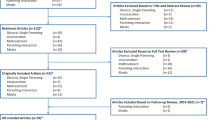Abstract
Most of what is known about attention-deficit/hyperactivity disorder (ADHD) and family functioning has been derived from studies that used children with ADHD as the starting point for their investigations. Such research has consistently reported that parent- child interactions are often characterized by a high degree of negativity and conflict. Also commonly found in such families are the use of less effective parenting strategies, elevated levels of parenting stress, higher rates of parental depression and other types of psychological distress, lower levels of marital satisfaction, and increased sibling conflict. Although a great deal of progress has been made, many questions remain as to how ADHD plays out in families. Several research design issues have limited our understanding of this topic, including an absence of empirical attention to underlying conceptual processes that may serve to explain the link between ADHD and various family outcomes. Implications for future research and clinical practice are discussed.
Similar content being viewed by others
References and Recommended Reading
Barkley RA: Attention-Deficit Hyperactivity Disorder: A Handbook for Diagnosis and Treatment, edn 3. New York: Guilford Press; 2006.
Danforth JS, Barkley RA, Stokes TF: Observations of parent-child interactions with hyperactive children: research and clinical implications. Clin Psychol Rev 1991, 11:703–727.
DuPaul GJ, McGoey KE, Eckert TL, VanBrakle J: Preschool children with attention-deficit/hyperactivity disorder: impairments in behavioral, social, and school functioning. J Am Acad Child Adolesc Psychiatry 2001, 40:508–515.
Taylor EA, Sandberg S, Thorley G, Giles S: The Epidemiology of Childhood Hyperactivity. London: Oxford University Press; 1991.
Barkley RA, Anastopoulos AD, Guevremont DC, Fletcher KE: Adolescents with attention deficit hyperactivity disorder: mother-adolescent interactions, family beliefs and conflicts, and maternal psychopathology. J Abnorm Child Psychol 1992, 20:263–288.
Buhrmester D, Camparo L, Christensen A, et al.: Mothers and fathers interacting in dyads and triads with normal and hyperactive sons. Dev Psychol 1992, 28:500–509.
Barkley RA, Murphy KR, Fischer M: ADHD in Adults: What the Science Says. New York: Guilford Press; 2008.
Chronis-Tuscano A, Raggi VL, Clarke TL, et al.: Associations between maternal attention-deficit/hyperactivity disorder symptoms and parenting. J Abnorm Child Psychol 2008, 36:1237–1250.
Harvey E, Danforth JS, Eberhardt McKee T, et al.: Parenting of children with attention-deficit/hyperactivity disorder (ADHD): the role of parental ADHD symptomatology. J Atten Disord 2003, 7:31–42.
Sonuga-Barke EJS, Daley D, Thompson M: Does maternal ADHD reduce the effectiveness of parent training for preschool children’s ADHD? J Am Acad Child Adolesc Psychiatry 2002, 41:696–702.
Johnston C, Mash EJ: Families of children with attention-deficit/hyperactivity disorder: review and recommendations for future research. Clin Child Fam Psychol Rev 2001, 4:183–207.
Podolski C-L, Nigg JT: Parent stress and coping in relation to child ADHD severity and associated child disruptive behavior problems. J Clin Child Psychol 2001, 30:503–513.
Anastopoulos AD, Guevremont DC, Shelton TL, DuPaul GJ: Parenting stress among families of children with attention deficit hyperactivity disorder. J Abnorm Child Psychol 1992, 20:503–520.
Harrison C, Sofronoff K: ADHD and parental psychological distress: role of demographics, child behavioral characteristics, and parental cognitions. J Am Acad Child Adolesc Psychiatry 2002, 41:703–711.
Gerdes AC, Hoza B, Arnold LE, et al.: Maternal depressive symptomatology and parenting behavior: exploration of possible mediators. J Abnorm Child Psychol 2007, 35:705–714.
Befera MS, Barkley RA: Hyperactive and normal girls and boys: mother-child interaction, parent psychiatric status and child psychopathology. J Child Psychol Psychiatry 1985, 26:439–452.
Faraone SV, Biederman J: Do attention deficit hyperactivity disorder and major depression share familial risk factors? J Nerv Ment Dis 1997, 185:533–541.
Johnston C, Murray C, Hinshaw SP, et al.: Responsiveness in interactions of mothers and sons with ADHD: relations to maternal and child characteristics. J Abnorm Child Psychol 2002, 30:77–88.
Owens EB, Hinshaw SP, Kraemer HC, et al.: Which treatment for whom for ADHD? Moderators of treatment response in the MTA. J Consult Clin Psychol 2003, 71:540–552.
Chronis AM, Lahey BB, Pelham WE Jr, et al.: Maternal depression and early positive parenting predict future conduct problems in young children with attention-deficit/hyperactivity disorder. Dev Psychol 2007, 43:70–82.
Kendall J: Sibling accounts of attention deficit hyperactivity disorder (ADHD). Fam Process 1999, 38:117–136.
Mikami AY, Pfiffner LJ: Sibling relationships among children with ADHD. J Atten Disord 2008, 11:482–492.
Mash EJ, Johnston C: Sibling interactions of hyperactive and normal children and their relationship to reports of maternal stress and self-esteem. J Clin Child Psychol 1983, 12:91–99.
Listug-Lunde L, Zevenbergen AA, Petros TV: Psychological symptomatology in siblings of children with ADHD. J Atten Disord 2008, 12:239–247.
Smith AJ, Brown RT, Bunke V, et al.: Psychosocial adjustment and peer competence of siblings of children with attention-deficit/hyperactivity disorder. J Atten Disord 2002, 5:165–177.
Breen MJ, Barkley RA: Child psychopathology and parenting stress in girls and boys having attention deficit disorder with hyperactivity. J Pediatr Psychol 1988, 13:265–280.
Biederman J, Faraone SV, Spencer T, Wilens T: Patterns of psychiatric comorbidity, cognition, and psychosocial functioning in adults with attention deficit hyperactivity disorder. Am J Psychiatry 1993, 150:1792–1798.
Weiss G, Hechtman LT: Hyperactive Children Grown Up: ADHD in Children, Adolescents, and Adults, edn 2. New York: Guilford Press; 1993.
Eakin L, Minde K, Hechtman L, et al.: The marital and family functioning of adults with ADHD and their spouses. J Atten Disord 2004, 8:1–10.
Author information
Authors and Affiliations
Corresponding author
Rights and permissions
About this article
Cite this article
Anastopoulos, A.D., Sommer, J.L. & Schatz, N.K. ADHD and family functioning. Curr Atten Disord Rep 1, 167–170 (2009). https://doi.org/10.1007/s12618-009-0023-2
Published:
Issue Date:
DOI: https://doi.org/10.1007/s12618-009-0023-2




